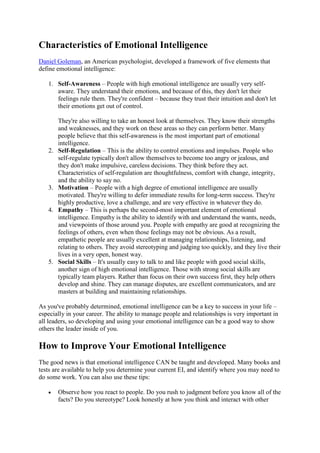
Characteristics of emotional intelligence
- 1. Characteristics of Emotional Intelligence Daniel Goleman, an American psychologist, developed a framework of five elements that define emotional intelligence: 1. Self-Awareness – People with high emotional intelligence are usually very self- aware. They understand their emotions, and because of this, they don't let their feelings rule them. They're confident – because they trust their intuition and don't let their emotions get out of control. They're also willing to take an honest look at themselves. They know their strengths and weaknesses, and they work on these areas so they can perform better. Many people believe that this self-awareness is the most important part of emotional intelligence. 2. Self-Regulation – This is the ability to control emotions and impulses. People who self-regulate typically don't allow themselves to become too angry or jealous, and they don't make impulsive, careless decisions. They think before they act. Characteristics of self-regulation are thoughtfulness, comfort with change, integrity, and the ability to say no. 3. Motivation – People with a high degree of emotional intelligence are usually motivated. They're willing to defer immediate results for long-term success. They're highly productive, love a challenge, and are very effective in whatever they do. 4. Empathy – This is perhaps the second-most important element of emotional intelligence. Empathy is the ability to identify with and understand the wants, needs, and viewpoints of those around you. People with empathy are good at recognizing the feelings of others, even when those feelings may not be obvious. As a result, empathetic people are usually excellent at managing relationships, listening, and relating to others. They avoid stereotyping and judging too quickly, and they live their lives in a very open, honest way. 5. Social Skills – It's usually easy to talk to and like people with good social skills, another sign of high emotional intelligence. Those with strong social skills are typically team players. Rather than focus on their own success first, they help others develop and shine. They can manage disputes, are excellent communicators, and are masters at building and maintaining relationships. As you've probably determined, emotional intelligence can be a key to success in your life – especially in your career. The ability to manage people and relationships is very important in all leaders, so developing and using your emotional intelligence can be a good way to show others the leader inside of you. How to Improve Your Emotional Intelligence The good news is that emotional intelligence CAN be taught and developed. Many books and tests are available to help you determine your current EI, and identify where you may need to do some work. You can also use these tips: Observe how you react to people. Do you rush to judgment before you know all of the facts? Do you stereotype? Look honestly at how you think and interact with other
- 2. people. Try to put yourself in their place, and be more open and accepting of their perspectives and needs. Look at your work environment. Do you seek attention for your accomplishments? Humility can be a wonderful quality, and it doesn't mean that you're shy or lack self- confidence. When you practice humility, you say that you know what you did, and you can be quietly confident about it. Give others a chance to shine – put the focus on them, and don't worry too much about getting praise for yourself. Do a self-evaluation. What are your weaknesses? Are you willing to accept that you're not perfect and that you could work on some areas to make yourself a better person? Have the courage to look at yourself honestly – it can change your life. Examine how you react to stressful situations. Do you become upset every time there's a delay or something doesn't happen the way you want? Do you blame others or become angry at them, even when it's not their fault? The ability to stay calm and in control in difficult situations is highly valued – in the business world and outside it. Keep your emotions under control when things go wrong. Take responsibility for your actions. If you hurt someone's feelings, apologize directly – don't ignore what you did or avoid the person. People are usually more willing to forgive and forget if you make an honest attempt to make things right. Examine how your actions will affect others – before you take those actions. If your decision will impact others, put yourself in their place. How will they feel if you do this? Would you want that experience? If you must take the action, how can you help others deal with the effects? See our article on Emotional Intelligence in Leadership for specific tips related to that role. Key Points Although "regular" intelligence is important to success in life, emotional intelligence is key to relating well to others and achieving your goals. Many people believe that emotional intelligence is at least as important as regular intelligence, and many companies now use EI testing to hire new staff. Emotional intelligence is an awareness of your actions and feelings – and how they affect those around you. It also means that you value others, listen to their wants and needs, and are able to empathize or identify with them on many different levels.